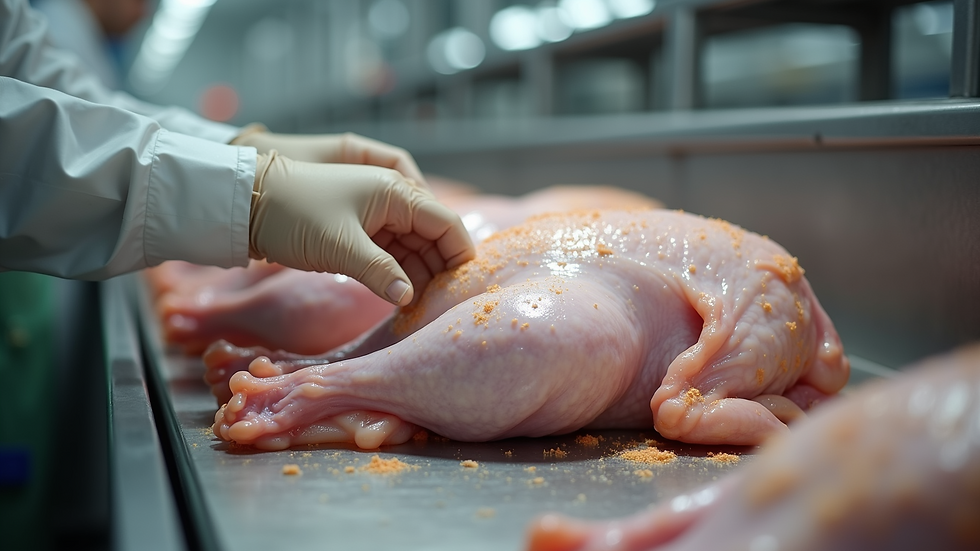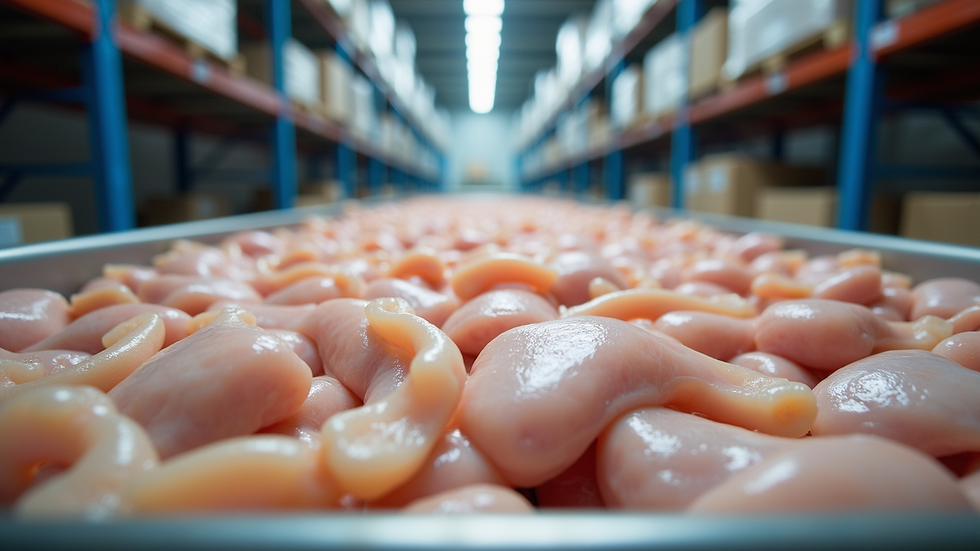Understanding Brazilian Halal Chicken Standards
- Levin James
- Oct 12
- 4 min read
When it comes to sourcing halal chicken, quality and compliance are non-negotiable. Brazil has become a major player in the global halal poultry market, and for good reason. But what exactly makes Brazilian halal chicken stand out? How do their standards ensure the product meets strict halal requirements? And is chicken from Brazil safe to eat? Let’s dive into these questions and explore the details behind Brazilian halal chicken standards.
What Are Halal Chicken Standards?
Halal chicken standards refer to the specific guidelines and practices that ensure poultry is prepared according to Islamic law. These standards cover everything from the sourcing of the birds to the slaughtering process, packaging, and certification. The goal is to guarantee that the chicken is permissible for consumption by Muslim consumers worldwide.
Brazilian halal chicken standards are particularly rigorous. They combine traditional halal requirements with modern food safety and quality controls. This means the chicken is not only halal but also fresh, hygienic, and traceable.
Here are some key points about halal chicken standards:
Slaughtering Method: The bird must be alive and healthy at the time of slaughter. The slaughterer must be a Muslim who recites the appropriate prayer. The cut must sever the trachea, oesophagus, and major blood vessels to ensure quick and humane death.
No Cross-Contamination: Equipment and facilities must be thoroughly cleaned to avoid contact with non-halal products.
Certification: Independent halal certification bodies audit and approve the entire process.
Traceability: Every batch of chicken can be traced back to its origin, ensuring transparency and accountability.

These standards are essential for importers and distributors who want to guarantee their customers receive authentic halal products. Brazil’s commitment to these practices has helped it become a trusted supplier in over 90 countries.
How Brazil Ensures Compliance with Halal Chicken Standards
Brazil’s poultry industry is one of the largest in the world, and it has invested heavily in halal certification to meet global demand. The country’s halal chicken standards are enforced through a combination of government regulations, private sector initiatives, and international certification bodies.
Here’s how Brazil ensures compliance:
Strict Regulatory Framework
The Brazilian government works closely with halal certification agencies to monitor slaughterhouses and processing plants. Regular inspections ensure that halal procedures are followed without compromise.
Certified Slaughterhouses
Only approved slaughterhouses that meet halal requirements are allowed to produce halal chicken. These facilities have dedicated halal lines to prevent contamination.
Training and Education
Workers involved in halal chicken production receive specialised training on halal principles and hygiene standards. This reduces errors and maintains consistency.
Third-Party Certification
Independent halal certification bodies conduct audits and issue certificates. These certificates are recognised internationally, providing confidence to importers and distributors.
Advanced Traceability Systems
Brazil uses technology to track chicken from farm to fork. This traceability helps quickly identify and resolve any issues that may arise.

By combining these measures, Brazil guarantees that its halal chicken meets the highest standards. This is why many foodservice and wholesale partners trust Brazilian suppliers for their halal poultry needs.
Is Chicken from Brazil Safe to Eat?
Safety is a top priority when importing chicken, halal or not. Brazil has faced scrutiny in the past regarding food safety, but the industry has made significant improvements. Today, Brazilian chicken is considered safe and reliable by many international markets.
Here’s why:
Strict Hygiene Protocols
Processing plants follow stringent hygiene and sanitation protocols. This includes regular cleaning, pest control, and temperature monitoring.
Quality Control Checks
Multiple quality control points throughout the production process ensure that only safe, high-quality chicken reaches the market.
Compliance with International Standards
Brazil’s poultry exports comply with international food safety standards such as HACCP (Hazard Analysis and Critical Control Points) and ISO certifications.
Halal Certification Adds Another Layer of Assurance
The halal certification process includes checks for cleanliness and proper handling, which further enhances safety.
Cold Chain Management
Brazilian exporters maintain a strict cold chain from slaughter to delivery, preserving freshness and preventing bacterial growth.

For importers and distributors, this means Brazilian halal chicken is not only halal but also safe and fresh. It’s a product you can confidently offer to your customers.
Practical Tips for Importers and Distributors
If you’re considering sourcing halal chicken from Brazil, here are some practical tips to keep in mind:
Verify Certification
Always check that the supplier has valid halal certification from a reputable body. Ask for documentation and audit reports if needed.
Understand the Supply Chain
Learn about the supplier’s traceability system. Knowing the origin and processing details helps build trust.
Request Samples
Before placing large orders, request samples to assess quality, packaging, and freshness.
Check Packaging and Labelling
Ensure packaging meets your market’s requirements, including halal logos, expiry dates, and storage instructions.
Communicate Clearly
Maintain open communication with your supplier about delivery schedules, quantities, and any special requirements.
Stay Updated on Regulations
Keep informed about import regulations and halal standards in your country to avoid compliance issues.
By following these steps, you can streamline your sourcing process and ensure a smooth supply of halal chicken to your customers.
Why Choose Brazilian Halal Chicken?
Brazil has earned a reputation as a reliable supplier of halal chicken. But what makes it stand out from other sources? Here are some reasons why Brazilian halal chicken is a smart choice:
Consistent Quality
Brazil’s poultry industry is highly developed, with modern facilities and strict quality controls.
Competitive Pricing
Large-scale production and efficient logistics help keep prices competitive without sacrificing quality.
Wide Availability
Brazil exports halal chicken to over 90 countries, making it easy to find suppliers and maintain steady supply.
Strong Certification and Compliance
The country’s halal certification process is robust and internationally recognised.
Sustainability Efforts
Many Brazilian producers are adopting sustainable farming and processing practices, which is increasingly important to consumers.
If you want to explore more about Brazilian halal chicken, check out brazil halal chicken for detailed information and supplier contacts.
Understanding the standards behind Brazilian halal chicken helps you make informed decisions. With strict compliance, safety measures, and global certification, Brazilian halal chicken offers a dependable option for your halal poultry needs. Whether you’re importing for foodservice or wholesale, Brazil’s halal chicken can meet your expectations for quality, safety, and authenticity.




Comments